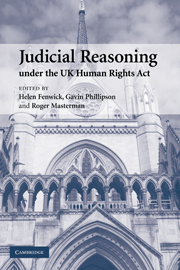Book contents
- Frontmatter
- Contents
- List of contributors
- Foreword
- Preface and acknowledgments
- Table of cases
- Table of legislation
- Table of treaties
- 1 The Human Rights Act in contemporary context
- PART I The interpretation of the Human Rights Act 1998
- 2 The European Convention on Human Rights and the Human Rights Act: the view from the outside
- 3 Aspiration or foundation? The status of the Strasbourg jurisprudence and the ‘Convention rights’ in domestic law
- 4 Institutional roles and meanings of ‘compatibility’ under the Human Rights Act 1998
- 5 Choosing between sections 3 and 4 of the Human Rights Act 1998: judicial reasoning after Ghaidan v. Mendoza
- 6 Clarity postponed: horizontal effect after Campbell
- 7 The standard of judicial review after the Human Rights Act
- 8 Principles of deference under the Human Rights Act
- PART II The Human Rights Act and substantive law
- Index
8 - Principles of deference under the Human Rights Act
Published online by Cambridge University Press: 30 October 2009
- Frontmatter
- Contents
- List of contributors
- Foreword
- Preface and acknowledgments
- Table of cases
- Table of legislation
- Table of treaties
- 1 The Human Rights Act in contemporary context
- PART I The interpretation of the Human Rights Act 1998
- 2 The European Convention on Human Rights and the Human Rights Act: the view from the outside
- 3 Aspiration or foundation? The status of the Strasbourg jurisprudence and the ‘Convention rights’ in domestic law
- 4 Institutional roles and meanings of ‘compatibility’ under the Human Rights Act 1998
- 5 Choosing between sections 3 and 4 of the Human Rights Act 1998: judicial reasoning after Ghaidan v. Mendoza
- 6 Clarity postponed: horizontal effect after Campbell
- 7 The standard of judicial review after the Human Rights Act
- 8 Principles of deference under the Human Rights Act
- PART II The Human Rights Act and substantive law
- Index
Summary
My own view is that the discussion of judicial deference – or the ‘discretionary area of judgment’ which the judiciary will afford the democratic arms of the state – is not quite as complex as some commentators might lead one to believe. I think that by now the principles dealing with the courts’ approach to proportionality and deference are becoming reasonably identifiable in the leading cases. And I think that most judges would subscribe to the summary given by Lord Justice Laws in the case of International Transport Roth GmbH v. Secretary of State for the Home Department – principles indeed which were generally approved in the House of Lords by Lord Walker in the ProLife Alliance case. The principles laid down by Lord Justice Laws in Roth were as follows:
‘greater deference is to be paid to an Act of Parliament than to a decision of the executive or a subordinate measure’;
‘there is more scope for deference “where the Convention itself requires a balance to be struck, much less so where the right is stated in terms which are unqualified” (per Lord Hope in ex parte Kebeline)’;
‘greater deference will be due to the democratic powers where the subject matter in hand is peculiarly within their constitutional responsibility, and less when it lies more particularly within the constitutional responsibility of the courts’; and
‘greater or less deference will be due according to whether the subject matter lies more readily within the actual or potential expertise of the democratic powers or the courts’.
- Type
- Chapter
- Information
- Judicial Reasoning under the UK Human Rights Act , pp. 206 - 212Publisher: Cambridge University PressPrint publication year: 2007



